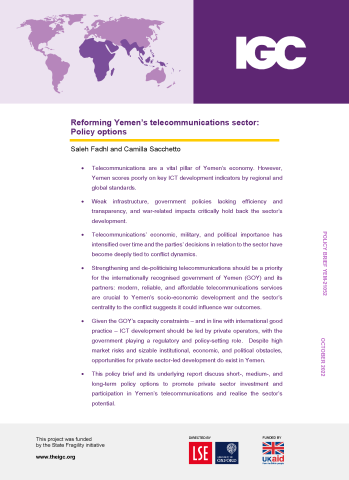-
Fadhl and Sacchetto Policy brief October 2022_EN.pdf
PDF document • 282.66 KB
- Telecommunications are a vital pillar of Yemen’s economy. However, Yemen scores poorly on key ICT development indicators by regional and global standards.
- Weak infrastructure, government policies lacking efficiency and transparency, and war-related impacts critically hold back the sector’s development.
- Telecommunications’ economic, military, and political importance has intensified over time and the parties’ decisions in relation to the sector have become deeply tied to conflict dynamics.
- Strengthening and de-politicising telecommunications should be a priority for the internationally recognised government of Yemen (GOY) and its partners: modern, reliable, and affordable telecommunications services are crucial to Yemen’s socio-economic development and the sector’s centrality to the conflict suggests it could influence war outcomes.
- Given the GOY’s capacity constraints – and in line with international good practice – ICT development should be led by private operators, with the government playing a regulatory and policy-setting role. Despite high market risks and sizable institutional, economic, and political obstacles, opportunities for private sector-led development do exist in Yemen.
- This policy brief and its underlying report discuss short-, medium-, and long-term policy options to promote private sector investment and participation in Yemen’s telecommunications and realise the sector’s potential




